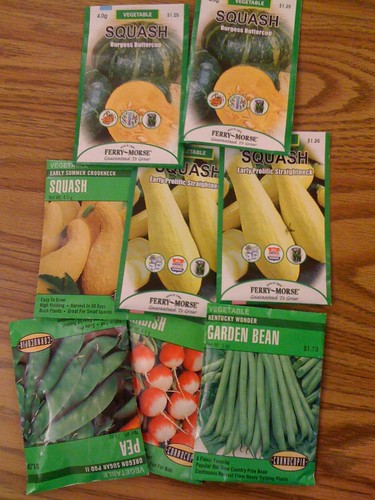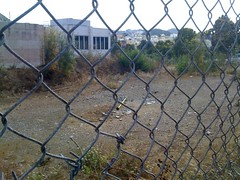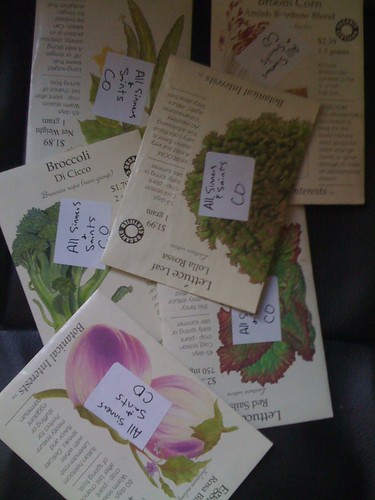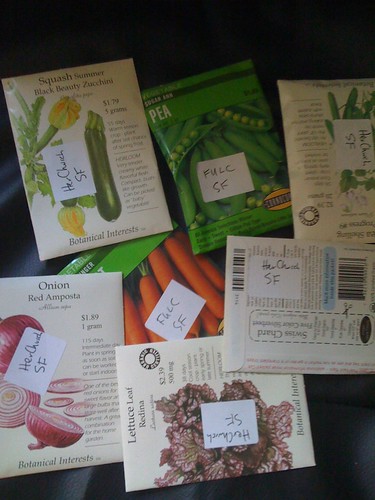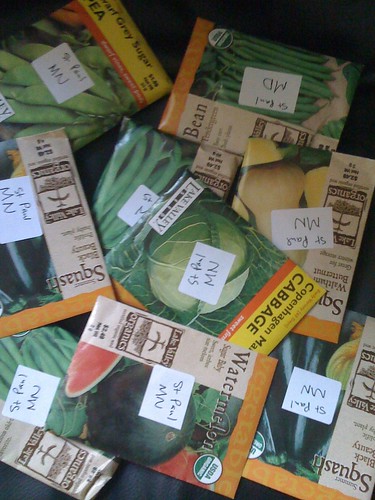Friday, August 28, 2009
Sunday, August 16, 2009
Saturday, August 15, 2009
Introducing SF Recycling & Disposal: Artists in Residence Program
 The Artist In Residence (AIR) Program at SF Recycling & Disposal, Inc. is an innovative program that inspires and educates people about recycling and resource conservation by providing local artists with access to materials, a work space, and other resources at our Solid Waste Transfer and Recycling Center.
The Artist In Residence (AIR) Program at SF Recycling & Disposal, Inc. is an innovative program that inspires and educates people about recycling and resource conservation by providing local artists with access to materials, a work space, and other resources at our Solid Waste Transfer and Recycling Center.But, this is no ordinary dump, they are also the home of the only known art park inside of a garbage company. View their sculpture garden.
Additionally, AIR has just created a raised bed garden using recycled redwood lumber that was thrown away (despite being unused) from construction projects. They're also growing produce in recycling containers and other found items.
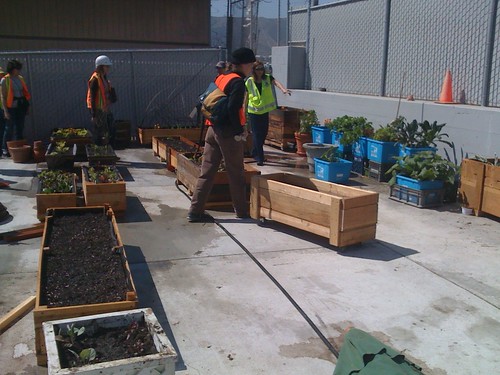
SF Recycling & Disposal not only recycles plastics, papers, batteries, electronics, tires and other items, but they also recycle paint. The paint (considered a hazardous material which cannot be put in the dump) is given away for free. We will be using some of this paint for our community arts projects.
Learn more about: SF Recycling & Disposal's Artists in Residence Program
Friday, August 14, 2009
Special Thanks to the Sam Mazza Foundation
The Sam Mazza Foundation supports initiatives that strengthen communities through enriching culture, improving education and addressing physical and environmental health issues. The foundation gives special consideration to grantees who work to improve the condition of disadvantaged or marginalized populations. Founded in the belief that meaningful change requires a socially-responsible vision and innovative thinking, the Sam Mazza Foundation empowers charitable organizations to pursue a wide variety of projects that have a direct and measurable impact on the communities they serve.
Tuesday, August 11, 2009
Introducing Joshua "Griff" Griffin and the Episcopal Diocese of California
 Joshua "Griff" Griffin is a postulant for holy orders in the Episcopal Church, and currently serves as the Environmental Justice Missioner for the Diocese of California. Griff grew up in Rhode Island and has lived all over New England, receiving his primary education from the White Mountains of New Hampshire. In May 2009, he received his M.Div from Harvard Divinity School and a Religion and Ecology Certificate from the Boston Theological Institute. He has a B.A. from Dartmouth College where he majored in Religion and Environmental Studies. After college he worked as an intern at the Global Living Project, formerly located at the historic Barra Homstead in East Corinth, VT. Griff has traveled extensively through Rwanda, Uganda, Kenya, South Africa, Namibia, Swaziland and Mozambique, studying the relationship between environmental, social, and economic issues in East and Southern Africa. For the last several years he has been trying to perfect the art of growing greens in a Boston apartment and is awestruck by California's infinite growing season. He lives in the Inner Sunset with his wife, Liz, a UCSF medical student with a passion for kale, and their 1,000,000,000 pet worms.
Joshua "Griff" Griffin is a postulant for holy orders in the Episcopal Church, and currently serves as the Environmental Justice Missioner for the Diocese of California. Griff grew up in Rhode Island and has lived all over New England, receiving his primary education from the White Mountains of New Hampshire. In May 2009, he received his M.Div from Harvard Divinity School and a Religion and Ecology Certificate from the Boston Theological Institute. He has a B.A. from Dartmouth College where he majored in Religion and Environmental Studies. After college he worked as an intern at the Global Living Project, formerly located at the historic Barra Homstead in East Corinth, VT. Griff has traveled extensively through Rwanda, Uganda, Kenya, South Africa, Namibia, Swaziland and Mozambique, studying the relationship between environmental, social, and economic issues in East and Southern Africa. For the last several years he has been trying to perfect the art of growing greens in a Boston apartment and is awestruck by California's infinite growing season. He lives in the Inner Sunset with his wife, Liz, a UCSF medical student with a passion for kale, and their 1,000,000,000 pet worms.Learn more about the Diocese of California at: http://diocal.org/
Saturday, August 8, 2009
Introducing Pastor Megan Rohrer and WELCOME - a communal response to poverty
 Pastor Megan Rohrer has been the Executive Director of WELCOME (formerly the Welcome Ministry) since June of 2002 with calls from Ebenezer Lutheran Church (HerChurch), Christ Church Lutheran, St. Francis Lutheran and Saints Mary and Martha Lutheran.
Pastor Megan Rohrer has been the Executive Director of WELCOME (formerly the Welcome Ministry) since June of 2002 with calls from Ebenezer Lutheran Church (HerChurch), Christ Church Lutheran, St. Francis Lutheran and Saints Mary and Martha Lutheran.The Welcome Ministry was created in 1996 as a homeless ministry. Under Megan's leadership and with the help of the SF Homeless Outreach Team, the Welcome Ministry was able to help more than 155 chronically homeless guests, many of whom had lived outdoors for more than twenty years, move indoors. Responding to the fact that a majority of their guests were now living indoors, the Weclcome Ministry board decided to change the organizations name to WELCOME - a communal response to poverty.
WELCOME continues to work with many of the same guests to help them stay indoors, to recover from addiction and to live healither and more independent lives. Because most San Francisco residents living in poverty live in SRO's (Single Room Occupancy Hotel Rooms) without kitchens in their individual living quarters, Megan recognized the need to grow healthy food and have it prepared for guests who were unable to utilize typical food pantries.
The Urban Share Community Gardening Project exists as one part of a larger model, rooted in the notion of empowerment. By including WELCOME's guests in every stage of the food making process, guests can work to nourish their own bodies; from planting, growing and harvesting, to preparing and cooking, they now have access to actively participate in their community, feeding themselves and each other while healing from trauma and learning important life skills.
Megan has began working on the Urban Share Community Gardening Project since 2007 with the desire to act as the link between gardeners and organizations across the nation, connecting them to one another to implement them. Once the garden has been built, the community will take it under their wing, allowing for a model of self-sustainability.
Fresh produce for low income individuals
 Produce for those living in poverty is handed out for our guests to take home at our community meals. Many of our guests live in buildings that do not have cooking facilities. Typical food pantries give out food that requires cooking, we cook food for guests. Today we gave out fresh tomatoes, lettuce and cooked potatoes to 120 guests.
Produce for those living in poverty is handed out for our guests to take home at our community meals. Many of our guests live in buildings that do not have cooking facilities. Typical food pantries give out food that requires cooking, we cook food for guests. Today we gave out fresh tomatoes, lettuce and cooked potatoes to 120 guests. 
Friday, August 7, 2009
Introducing Tamara Loewenstein
 Tamara Loewenstein joins the Urban Share Community Gardening Project as curator and community arts organizer.
Tamara Loewenstein joins the Urban Share Community Gardening Project as curator and community arts organizer.Tamara Loewenstein is a curator, trained in the Curatorial Practice MA program at the California College of the Arts. A San Francisco native, her practice focuses on contemporary art, curating exhibitions in small, local, alternative arts venues throughout the city. Recent exhibitions include: Queerity (June, 2008) exhibited at Million Fishes Gallery, co-curated with Zee Boudreaux, which examined the ways queerly identified artists view, engage, [de]construct, and conceptualize the queer body. Cynosure (November, 2008) at the The Spare Room Project included multi-media work by artists whose practice explores both the boundaries and limitlessness of our perception and how this affects our communication with and observation of ourselves, one another and beyond, with the cosmos we inhabit. Her interests include archives/archiving + ephemera, public/guerrilla/performance art, zines and queer histories.
Learn more about Tamara at: www.tamaraloewenstein.com
Introducing Produce to the People and its Founder & Director Lauren Anderson
Today, we'd like to introduce to you Produce to the People. Founder and Director, Lauren Anderson is a San Francisco Garden and Compost Educator and food justice activist that loves to feed people. Lauren is our Garden Manager and will oversee all our San Francisco garden sites from their initial phases of planning and implementation, through to their completion.
PttP is also in the first season of our youth employment and education program, which creates summer jobs for high school students- harvesting produce, working at food distribution sites, and learning about local food systems, environmental stewardship, and community organizing.
PttP serves the community on many levels, by offering a free service that utilizes fresh, healthy food that would otherwise go to waste, by aiding in our local food security through the distribution of produce to our neighbors and friends who may not always have access to it, and by creating youth employment and environmental education.
St. Paulus Urban Farm - Western Addition, San Francisco
St. Paulus Lutheran - Western Addition District
 The 103 year old St. Paulus cathedral was destroyed by fire in 1995. And since then the congregation has been hoping to redevelop the site. Existing as ″church without walls″ in the Fillmore district of San Francisco, St. Paulus continues its history of ministry with the homeless, those living with HIV/AIDS and responding to racism and injustice.
The 103 year old St. Paulus cathedral was destroyed by fire in 1995. And since then the congregation has been hoping to redevelop the site. Existing as ″church without walls″ in the Fillmore district of San Francisco, St. Paulus continues its history of ministry with the homeless, those living with HIV/AIDS and responding to racism and injustice.This location has served as a garden in the past, but was ended as St. Paulus sought to redevelop the site. Recently as the current economic downturn has stalled the redevelopment project, the site will once again be used for gardening.
We hope to turn the site into an urban farm that can provide produce for low income residents in the area while also creating volunteer and arts opportunities.
Christ Church Lutheran - Sidewalk Garden - Sunset District, San Francisco
Christ Church Lutheran - Sunset District of San Francisco
Christ Church Lutheran recently fixed the concrete around the trees in front of their church. The open space around the trees leaves the perfect space for a sidewalk garden. Now all we need are the plants.
Help us transform this:

Into this:

Want to donate time or money? Learn more here: www.welcomeministry.org/garden/share
Have any of these items we need, please contact: megan@welcomeministry.org
Thursday, August 6, 2009
Goals and Practical Outcomes of the Urban Share Community Gardening Project:
· Create 3 rooftop, 15 sidewalk, 8 raised bed and 2 lot gardens throughout the city.
· Create an internship program that enables 4 youth and 12 individuals living in poverty to learn vocational skills.
· Create opportunities for communities to participate in gardening projects that are diverse, accessible, safe and educational. Increase the number of meals the Welcome Ministry serves by at least 5,000.
· Educate 150 low income individuals and elderly persons about health and nutrition by providing them with the skills to take care of their food needs.
· Connect at least 15 organizations and 250 volunteers with the issues of hunger and health through the community gardening projects.
· Provide education about hunger and poverty issues to 56 organizations.
· Provide trauma care for 100 individuals.
Design Priority:
All garden projects will be designed with the following priorities (when possible):
Food Distribution- The gardens (except for sidewalk gardens where food plants are not permitted) will primarily grow food that, when harvested, will be distributed to the low income volunteers, interns or local organizations that feed or distribute food to low income individuals.
Accessibility- We seek to involve the entire community in our gardening projects, which includes people with disabilities. In addition to working with our ADA coordinator and the Mayor’s Office on Disabilities, this project will also: create raised bed gardens at a comfortable height for wheelchair access; work with local organizations and disability communities to create special gardening opportunities for disability communities; and establish a volunteer mentoring program to support regular ongoing participation of volunteers with special needs. The mentoring program will use the empowerment model and seek to provide trauma care, employment skill training and harm reduction lessons for low income community members.
Sustainability- Sidewalk gardens will be planted with native and other drought-tolerant plants that provide nectar and habitat for urban wildlife: birds, butterflies and bees. The gardens attract these animals back to our streetsides, water flows in to replenish the aquifers, and opportunities are created for volunteers to learn about the unique ecology and biological diversity here in the Bay Area. The sidewalk gardens contribute to local food sustainability because they attract beneficial insects, like pollinators to nearby gardens.
Education- Online materials, curriculum, exhibits and volunteer events will enable this program to be replicated by other groups and organizations. This will include listings of city and county laws, regulations, codes and permits needed to create gardens. Tours of the gardens will be available for educational purposes. Sidewalk gardens provide an opportunity for community members to see and interact with neighbors who are actively working the soil as volunteers, providing a great opportunity to educate the public about the less visible rooftop or back-yard food production gardens.
Creative Reuse- Using a model we call Urban Share, we will use recycled materials to build and maintain garden spaces and to create and support communal tool sharing projects.
Organic- Our project will teach people to garden and grow food without the use of harmful petroleum-based pesticides and fertilizers. We will build and educate each site on the use of a compost bin, which will recycle food and plant waste and create organic matter on site for each garden.
Donations Needed, Can You Share?
- Shovels
- Digging
- Forks
- Pitchforks
- Trowels
- Hand cultivators
- Pruners
- Hoses
- Hose Nozzles
- Wheelbarrows
- Gloves
- straw
- pallets
- milk crates
- plants
- seeds
Have any of these items we need, please contact: megan@welcomeministry.org
The Welcome Ministry is a 501(c)3 organizations and we can give you a letter acknowledging your donation for tax purposes.
Wednesday, August 5, 2009
Sidewalk Gardens - why & how - video
Amber from the Mission Greenbelt Project describes why and how sidewalk gardens are created. If you are interested in having a sidewalk garden at your site please contact: megan@welcomeministry.org
Tuesday, August 4, 2009
Community Gardening Project begins!
If you'd like to send us some produce seeds, please send them to:
The Welcome Ministry
1751 Sacramento St
San Francisco CA 94109
We'll take pictures of them as they grow so you can see their journey on to a dinner plate!
The Urban Share Community Gardening Project takes advantage of underutilized city spaces by transforming them into community spaces; the results providing a tangible resource and tools for residents to learn about environmental protection, creative reuse and to address local hunger.
Our philosophy of urban sharing: We receive nearly all of our resources as in-kind donations (food, clothing, toiletries, volunteer time, office supplies, computers, kitchen supplies, etc.) ensuring that we can continue to provide critical counseling and advocacy services offered by our expert staff members. Are you willing to share?
About Our Organization:
When the Welcome Ministry was founded in 1996, our initial mission was to work with the homeless. In 2008, our work resulted in over 155 people moving indoors, causing the Welcome Ministry board (in 2009) to change both our name and our mission to: WELCOME – a communal response to poverty. We are just beginning the process of legally changing our name. We continue to work with the same low income individuals to help them learn the skills they need to remain indoors, to improve their quality of life and to become self-sustaining individuals.

